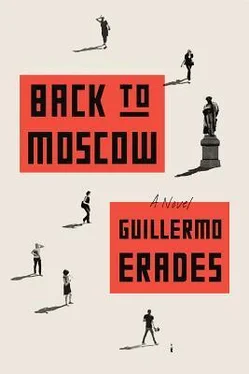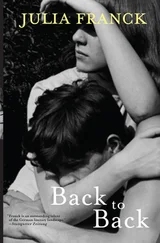‘You know,’ he said, ‘I was born in Moscow. I’ve lived all my life in this city, and yet I don’t always feel I belong here. I get stopped in the street all the time by policemen hoping that I’m an illegal immigrant and they can squeeze some rubles out of me.’ He took a sip of beer. ‘They’re kids, these policemen, illiterate drunks who think they’re important just because they wear uniforms.’
I took a piece of cucumber. I could see Sergey’s eyes were watery, tears waiting to be released.
‘It’s about Ira,’ he said, head down, now brushing his thick eyebrows with his thumbs.
‘Is she OK?’
Sergey lifted the beer bottle, drank a few gulps, placed it back on the table. He started to peel the label. ‘She’s fucking another guy.’
‘In what sense?’
‘An American asshole,’ Sergey said. ‘From work. She told me. Well, it’s more that I caught her. My mobile phone ran out of credit so I used her phone to text a friend. When I went to check that my text had been sent, I saw a sent message in English. You know my English is not very good, but I knew what it meant.’
‘Your English is good.’
‘The message said I miss you . It was sent to this guy Robert S, her boss at the firm. So I asked Ira about the message and she started shouting at me, saying that I was breaching her privacy because I had looked at her mobile phone. As if that was the important thing.’
‘I see.’
Sergey was staring at the bottle of beer, tearing strips from the label, placing them next to each other on the table. ‘She told me they had just been flirting and nothing else but, when I insisted, she admitted that they have been sleeping together. For a few weeks.’
Sergey held the bottle to his lips and, as he began drinking, let out a sob. He choked and spat some beer on the table.
‘I’m sorry,’ he said, now openly crying.
‘Don’t worry.’ I took a roll of paper towel and handed it to him. He made a ball of paper, wiped the table. Then he tore another piece of paper towel off the roll and blew his nose.
‘I’m so fucking stupid,’ he said.
‘Calm down, man.’
‘I’m wasting my life. I’m not doing anything meaningful. I left university so that I could work and take photos and now I’m not even doing that. Ira is the only thing I have.’
He covered his eyes with one hand and cried.
I searched for something appropriate to say but nothing came to mind.
‘And now she’s gone,’ he said. ‘She just packed a few things and said she’d go to a friend’s place.’
Sergey finished the rest of his beer.
‘Want another one?’ I asked.
‘Please.’
I got another Baltika from the fridge and opened it for him.
Sergey was silent for a while, staring at the samovar on the table.
‘I’m sure the American guy makes tons of money,’ he finally said, shaking his head.
‘I don’t think Ira is the type of woman who cares about that.’
‘Of course she does. They all do. Women don’t give a shit about a smart guy or an interesting partner. All they want is someone who earns enough to buy them stuff. That’s why Russian babas run after foreigners.’
‘But Ira has a good job. She can buy her own stuff.’
Sergey blew his nose again, took a slice of cucumber.
‘Can you talk to her?’ he said. ‘Please.’
‘I don’t think that’s going to change much.’
‘You’re her friend, she’ll listen to you. I want to know why she did it, if she wants to come back to me.’
‘I don’t think my getting involved is going to help you in any way. Maybe it’s better that you speak to her.’
‘Please, talk to her. Please.’
Sergey’s mobile rang. He glanced at it and silenced it without taking the call.
‘It’s my mum,’ he said. ‘She’s been calling the whole day. She’s worried I’m going to kill myself or something.’
‘Maybe you should give her a ring.’
‘Later,’ he said. He looked around the kitchen, as if inspecting the walls. ‘Expats have a great life. With all the money and the good flats, partying all day and meeting Russian girls.’
‘Most of us work as well,’ I said. ‘It’s not all a big party. My research takes up quite a lot of my time.’
From the books on the table Sergey grabbed my Penguin Classics edition of Chekhov’s plays, translated by Elisaveta Fen.
‘I thought you read these things in Russian,’ he said.
‘I like to read them in English as well, just to make sure I’m not missing anything.’
‘Even Chekhov?’ he asked. ‘Don’t you know these plays by heart?’
‘There’s always something new every time you read them. And it’s interesting to see how translators go about concepts that don’t really translate. For example, there is this quote in Three Sisters .’ I took the book from Sergey’s hands and opened it at one of the marked pages. ‘Look here,’ I said, pointing at an underlined paragraph halfway down the page. ‘At the beginning of the first act, Irina says, “If only we could go back to Moscow.” But if you read the Russian original, as Chekhov wrote it, what Irina really says—’
‘I can’t read fiction any more,’ Sergey said abruptly, looking not at my book, but at his beer. ‘Such a waste of time. I haven’t read a novel in years. There are so many interesting things to read about real life in newspapers and magazines or history books. Why bother reading something that someone made up?’
‘I used to think like that,’ I said, disappointed by Sergey’s lack of interest. ‘But in the end, if you think about it, fiction is not that different from non-fiction. Non-fiction offers a very partial view of reality. When authors choose what to say and what to leave out, they are already distorting facts. Because the biggest chunk of any story, real or fictional, always remains untold.’
‘The book you plan to write about Moscow,’ he said, ‘will it be a memoir or fiction?’
‘What’s the difference?’
‘Things either happen or don’t happen.’
‘Not that simple,’ I said. ‘Memory is very selective, it changes the past. In the end, all memoirs are fiction.’
Sergey closed his eyes for a couple of seconds.
‘I guess,’ I said, ‘that if I ever write my book about Moscow, I’ll just bury my own experiences within a fictional story.’
Sergey stood up, anchoring his hand on the wall to keep his balance. ‘Need to go to the toilet,’ he said, tumbling out of the kitchen.
When he came back a couple of minutes later he didn’t sit down. He took the beer and finished it in three or four long gulps.
‘I don’t want to keep you up,’ he said. ‘It’s very late, sorry to drop in on you like that. I’m heading home.’
He walked out of the kitchen, sat on the stool by the entrance and started to put his shoes on.
‘Would you talk to her?’ he said.
‘I’m not sure it’s going to help.’
‘Please.’
‘I’ll see what I can do.’
Sergey put his coat on and we hugged goodbye. He kept hugging me for a few seconds, his beard scratching my neck. I patted his back, which was, I imagined, the manly and appropriate thing to do. When he had left the flat I cleared the beers from the kitchen, wiped the table and put the salt cucumbers back in the fridge.
LENA WAS NOT REPLYING to my messages or phone calls. As the days got colder and darker, I started to accept that she was no longer there, at the other end of the phone, waiting for my call.
Something strange happened to me. Now, when I was alone at home trying to watch a film, I would picture Lena lying at my side. Often, I would find myself staring at the Indian tapestry she’d given me, or at the empty couch, exchanging words with an imaginary Lena — comments about whatever I was watching: this is funny, ridiculous, I don’t get it — then trying to imagine what Lena would have said in return.
Читать дальше












